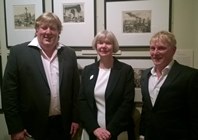An Abiding Standard: The Prints of Stanley Anderson RA

Left to right: Professor Robert Meyrick, Professor April McMahon and Dr Harry Heuser at the Royal Academy of Arts private view.
09 April 2015
This spring the Royal Academy of Arts in London presents an exhibition of prints by Stanley Anderson RA (1884-1966) curated by Professor Robert Meyrick and Dr Harry Heuser of the School of Art, Aberystwyth University. It is one of a series of exhibitions and catalogues raisonné celebrating the work of Royal Academician printmakers.
A fully illustrated and annotated catalogue raisonné of prints published by the Royal Academy coincides with the launch of the exhibition. Written by Robert Meyrick and Harry Heuser, it provides an in-depth assessment of Anderson’s oeuvre.
Today, Stanley Anderson is best known for his series of engravings memorialising Britain’s vanishing crafts, trades and farming practices. These carefully observed and meticulously executed portraits of traditional occupations provide us with a pictorial record of life and work in mid-twentieth century rural Britain. Presented together with Anderson’s earlier, lesser-known drypoints of urban life, they form a composite image of the artist’s world view. Sceptical of progress, Anderson sought to counter what he saw as the threat of modernity and its effect on the human spirit; the estrangement from nature, the loss of respect for physical work and the lack of a sense of fellowship. His work is characterised by rigour, wit and compassion.
Anderson’s printmaking career, informed by a seven-year apprenticeship as a trade engraver and put on hold during the Great War, was firmly rooted in the nineteenth century. The prints of James Abbott McNeill Whistler, in particular, were an early influence on his work. Anderson rejected the notion of art as a means of self-expression and questioned the insistence on originality. Instead, he believed that it was the artist’s ‘job’ to do justice to the subject through a mastery of medium and technique. ‘None of us can reach perfection’, Anderson once remarked, ‘but this need not deter us from making a sincere effort to do so and thoroughly enjoy the adventure’. The adventure took Anderson to London’s bustling outdoor markets of Billingsgate and Covent Garden, to urban construction sites and scenes of demolition, to Paris on the eve of the Great War and to the medieval cities of France, Spain, Germany and Czechoslovakia. A printmaker’s journey, it was motivated by a faith in an abiding standard.
Anderson’s works are in public collections in Britain and Europe, as well as Australia, New Zealand, the United States and Canada. He represented Britain at the Venice Biennale in 1938, was elected a Royal Academician in 1941, and ten years later was awarded a CBE in recognition of his services to the art of engraving.
Lunchtime talk
On Monday 27 April Robert Meyrick will give a lunchtime talk at the Royal Academy of Arts at which he will reassesses the work and career of this now marginalised printmaker and Royal Academician.
This follows on from talks on Stanley Anderson RA and informal tours of the exhibition given by Robert Meyrick and Harry Heuser on 3March and 7 April.
The exhibition runs until 24 May 2015 https://www.royalacademy.org.uk/exhibition/stanley-anderson.



